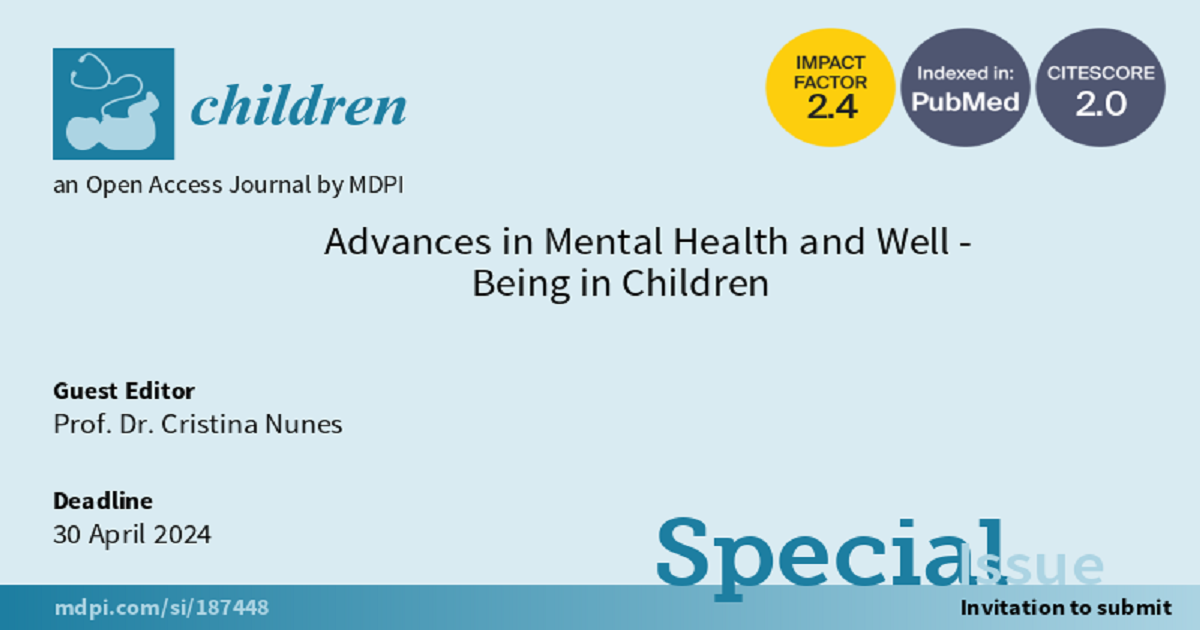Advances in Mental Health and Well-Being in Children
A special issue of Children (ISSN 2227-9067). This special issue belongs to the section "Child and Adolescent Psychiatry".
Deadline for manuscript submissions: 30 April 2024 | Viewed by 5868

Special Issue Editor
2. Department of Psychology and Education Sciences, University of Algarve, 8005-139 Faro, Portugal
Interests: at-risk family context assessment; family preservation; positive parenting; evidence-based interventions; well-being in children and adolescence
Special Issues, Collections and Topics in MDPI journals
Special Issue Information
Dear Colleagues,
Mental disorders are the largest cause of the burden of disease in the world. Evidence is accumulating on the broad impact that the well-being one has during childhood and adolescence has on physical and mental health across the course of a lifetime. In fact, most of the disease burden affecting adults has its onset during childhood and adolescence.
There is a growing concern about the mental health and well-being of children, with increasing demand for counselling services and referrals to mental health services. It has been well established in the existing literature that children and young people who experience positive support from parents and teachers may develop psychological resilience. Children and adolescents with higher levels of psychological well-being have higher levels of academic achievement; they are also more likely to have a higher level of engagement in school life and satisfaction in their later life, and they are usually more productive workers.
Family factors, including the quality of parental care, can make a huge difference to children’s early life pathways, for better or for worse. Understanding how best to intervene to support parents is a key challenge. Thus, there is a strong need to expand our knowledge on how to reduce risk factors and promote protective environments.
Considering the success and popularity of the Special Issue "Mental Health and Well-Being in Children", previously published in the Children journal (https://0-www-mdpi-com.brum.beds.ac.uk/journal/children/special_issues/Mental_Health_and_Well-being_in_Children), we are now set to release a second Special Issue that aims to address this topic by inviting scholars to share their findings, perspectives, and approaches, with the aim of promoting child mental health and well-being. Qualitative or quantitative contributions from basic or applied research that will improve the knowledge on key topics within this field are welcomed.
Prof. Dr. Cristina Nunes
Guest Editor
Manuscript Submission Information
Manuscripts should be submitted online at www.mdpi.com by registering and logging in to this website. Once you are registered, click here to go to the submission form. Manuscripts can be submitted until the deadline. All submissions that pass pre-check are peer-reviewed. Accepted papers will be published continuously in the journal (as soon as accepted) and will be listed together on the special issue website. Research articles, review articles as well as short communications are invited. For planned papers, a title and short abstract (about 100 words) can be sent to the Editorial Office for announcement on this website.
Submitted manuscripts should not have been published previously, nor be under consideration for publication elsewhere (except conference proceedings papers). All manuscripts are thoroughly refereed through a single-blind peer-review process. A guide for authors and other relevant information for submission of manuscripts is available on the Instructions for Authors page. Children is an international peer-reviewed open access monthly journal published by MDPI.
Please visit the Instructions for Authors page before submitting a manuscript. The Article Processing Charge (APC) for publication in this open access journal is 2400 CHF (Swiss Francs). Submitted papers should be well formatted and use good English. Authors may use MDPI's English editing service prior to publication or during author revisions.
Keywords
- children
- well-being
- mental health
- parenting
- family support
- evidence-based interventions
- resilience
- risk factors
- protective factors
Related Special Issue
- Mental Health and Well-Being in Children in Children (13 articles)






